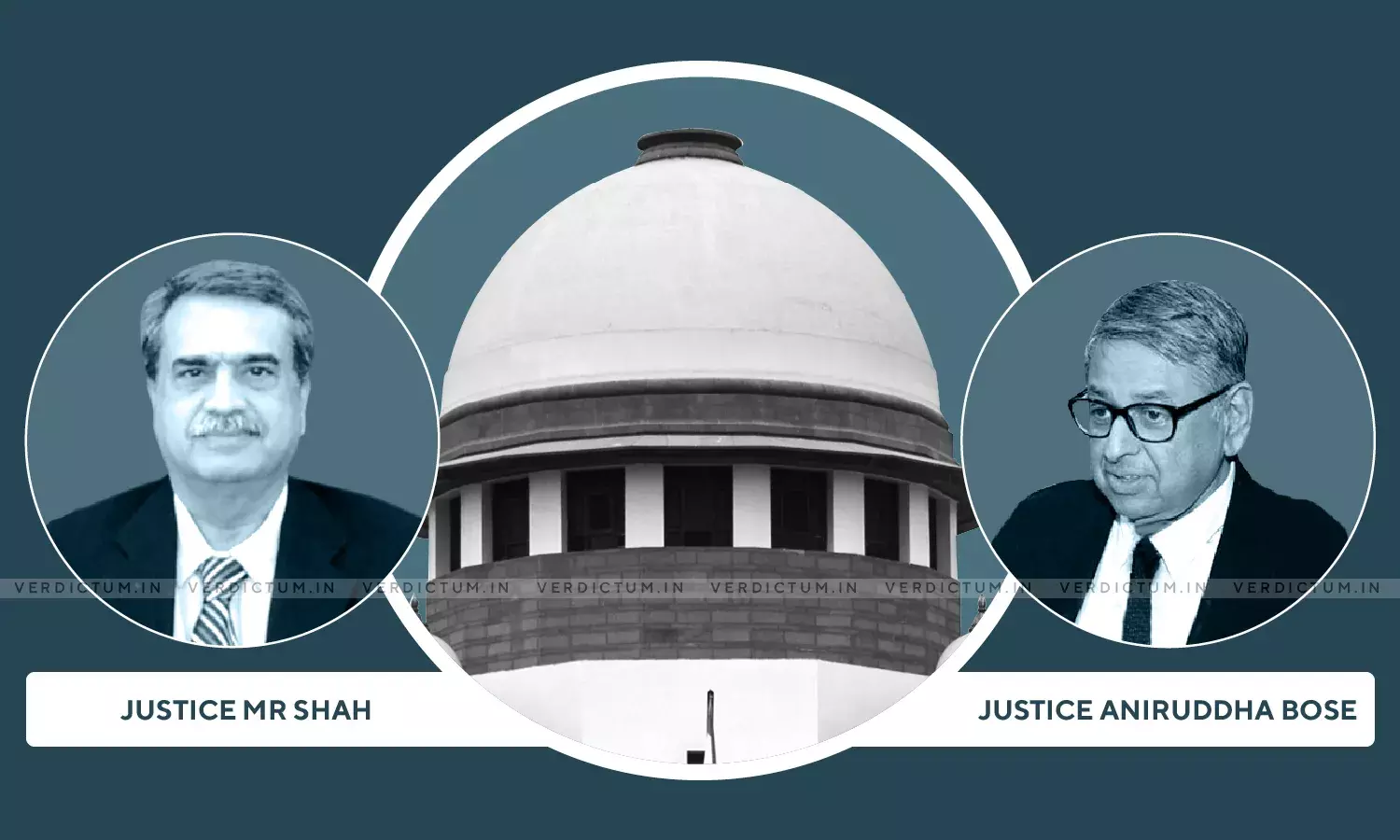Cognizance Of Offence Under SC/ST Act By A Magistrate Instead Of A Special Court, Does Not Vitiate Proceedings: Supreme Court
A two-judge Bench of Justice MR Shah and Justice Aniruddha Bose has held that merely because a Magistrate took cognizance of an offence under the Scheduled Caste and Scheduled Tribe (Prevention of Atrocities) Act, and thereafter the case was committed to the Special Court constituted under Section 14 of the Atrocities Act for the purpose of speedy trial, it would not lead to the entire criminal proceedings being vitiated.
An appeal was preferred before the Supreme Court against the impugned judgment passed by the Gujarat High Court which had set aside the FIR registered against the Respondent for the offences under Sections 452, 323, 325, 504, 506(2) and 114 of IPC and under Section 3(1)(x) of the Atrocities Act. The Court had also set aside the order of issuance of summons passed by the JMFC.
In this case, the Complainant alleged that she was abused by the accused Police officers with regards to her caste and that they also caused injuries to her. The accused also ransacked her house and beat her son and also took away her son. Since an FIR was not registered by Police upon her complaint, she filed a private complaint and the Magistrate ordered investigation under Section 156(3) of CrPC. Upon a report by the Police, the Magistrate took cognizance of the alleged offences by issuing process under Section 204 CrPC.
It was contended by the accused before the High Court that the Magistrate had no authority to take cognizance of the offences under the Atrocities Act and that only a Special Court could take cognizance of the same. It was argued there was a gross delay in lodging the FIR against the accused. Also, sanction under Section 197 CrPC was required, and in its absence the prosecution cannot be sustained.
The Appellant-complainant contended before the Supreme Court that after the amendment was made to Section 14 in 2016, a second proviso was added for the purposes of providing for a speedy trial. It was further argued that the amendment does not exclude the provision of CrPC but only clarify the position that the bar of Section 193 of the CrPC would not be ipso facto applicable. Also, it gives a choice to the Investigating Agency to file the report either before the Magistrate who will commit the matter to Special Court under Section 209 CrPC or file it directly before the Special Court, pleaded the Appellant.
It was further argued that interpretation given by the High Court would add premium to the alleged criminal actions of an accused who would not even be tried for serious offences merely because a final report has been forwarded to a wrong forum.
Counsel Mr. Nikhil Goel appeared for the Appellant while Counsel Mr. Aniruddha P. Mayee appeared for the State during the proceedings before the Supreme Court.
The issue which was dealt with by the Supreme Court was whether in a case where cognizance is taken by the Magistrate and thereafter the case is committed to the Special Court, whether entire criminal proceedings can be said to have been vitiated considering the second proviso to Section 14 of the Atrocities Act, which was inserted through an amendment.
The Apex Court while referring to certain precedents observed, "The delay in conclusion of the trial is direct nexus with the collective cry of the society and the anguish and agony of an accused (quaere a victim)."
The Court after referring to Sections 207, 209, and 193 of CrPC and second proviso to Section 14 of the Atrocities Act held that the entire criminal proceedings could not have been vitiated.
"It cannot be said that it takes away jurisdiction of the Magistrate to take cognizance and thereafter to commit the case to the Special Court for trial for the offences under the Atrocities Act," the Bench opined.
Theory of Prejudice to Accused
Concerning this, the Court observed –
i) In committal proceedings, Magistrate is only to see whether offence is triable by Court of Sessions;
ii) Limited jurisdiction of Magistrate is to verify the nature of offences (Section 209 CrPC);
iii) After verifying nature of offence and if it is exclusively triable by Court of Sessions, Magistrate to commit the case to Court of Sessions;
iv) Given the limited role of the Magistrate at the stage of committal, if an objection is raised by accused after the conviction, he has to satisfy that he was prejudiced and deprived of fair trial; and
v) It would be totally inapposite to hold that such non-compliance vitiates trial.
"If rights of the accused are not affected that flow under Section 14 of the Atrocities Act, the accused cannot make any grievance and it cannot be said that taking cognizance by the learned Magistrate for the offences under the Atrocities Act and thereafter to commit the case to the Special Court, he is prejudiced."
Offences under IPC
"We fail to appreciate how the criminal proceedings for the offences under the Indian Penal Code could have been set aside by the High Court while considering Section 14 of the Atrocities Act," the Court held.
Sanction under Section 197 CrPC
The Court held, "the High Court could have directed the authority to take sanction and then proceed, instead of completely quashing the entire criminal proceedings."
In the light of these observations, the Court set aside the impugned judgment of the High Court passed in exercise of powers under Section 482 of the CrPC read with Article 226 of the Constitution, allowed the appeal, and issued direction for the conduct of the trial against the accused before the Special Court.




